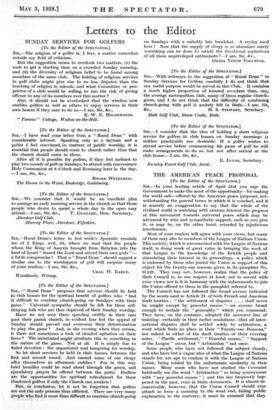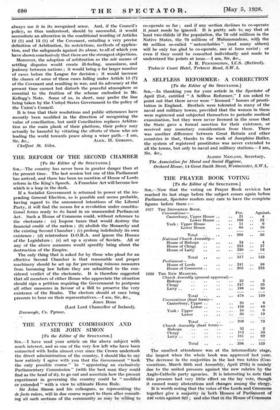THE AMERICAN PEACE PROPOSAL
[To the Editor of the SPECTATOR.] Szn,—In your leading article of April 21st you urge the Government to make the most of the opportunity—for making the world safe—offered by the American peace proposal, not- withstanding the general terms in which it is couched, and it is scarcely an exaggeration to say that the whole of the civilized world is watching with anxious interest the progress of this movement towards universal peace which may be advanced by wise and sympathetic support, such as you give it, or may be, on the other hand, retarded by injudicious interference.
Most of your readers will agree with your views, but many of them may also be members of the League of Nations Union. This society, which is unconnected with the League of Nations itself, is doing work of great value in bringing the work of that League to the knowledge of the British people and stimulating their interest in its proceedings—a policy which is endorsed by those who joined the Union in support of this object for the twenty-one reasons given in its• pamphlet No. 0.128. They may not, however, realize that the policy of their Council is, in one respect at least, not in accord with your views, nor is it in harmony with the inducements to join the Union offered to them in the pamphlet referred to.
The Council has not followed the broad avenue indicated by the words used in Article II. of both French and American draft treaties : "the settlement of disputes . . shall never be sought except by peaceful means "—an avenue broad enough to include the " generality " which you commend. They have, on the contrary, adopted the narrower line of insisting—certainly in their earlier resolutions—that all inter- national disputes shall be settled solely by arbitration, a word which fmds no place in their " Twenty-one Reasons," nor indeed in either of the draft treaties or their covering notes. " Pacific settlement," " Peaceful means," "Support of the League " occur, but " Arbitration " not once.
Some people who have not followed the subject closely, and who have but a vague idea of what the League of Nations stands for, are apt to confuse it with the League of Nations Union, being misled by the unfortunate similarity in their
names. Many more who have not studied the Covenant habitually use the word " Arbitration " as being synonymous with " any peaceful means " ; and this has frequently hap- pened in the past, even in State documents. It is almost in- conceivable, however, that the Union Council should ever attach so loose a meaning to the word and, failing public explanation to the contrary, it must be assumed that they
always use it in its recognized sense. And, if the Council's policy, as thus understood, should be successful, it would necessitate an alteration in the conditional wording of Articies 12 (1) and 18 (1) of the Covenant, entailing a very precise definition of Arbitration, its restrictions, methods of applica- tion, and the safeguards against its abuse, to all of which you have shown conclusively that there are the strongest objections.
Moreover, the adoption of arbitration as the sole means of settling disputes would create ill-feeling, uneasiness, and jealousy between nations ; it would bring a far larger number of cases before the League for decision ; it would increase the Chance of some of these cases falling under Article 15 (7) of the Covenant and resulting in war, and its advocacy at the present time cannot but disturb the peaceful atmosphere so essential to the fruition of the scheme embodied in Mr. Kellogg's Note. Some of us, in short, may prefer the line being taken by the United States Government to the policy of the Union's Council;
It is true that their resolutions and public utterances have recently been modified in the direction of recognizing the value of conciliation, but until Conciliation replaces Arbitra- tion as the main plank of their platform, their policy -may actually be harmful by vitiating the efforts of those who are leading the world towards peace along a wiser path.—I am,









































 Previous page
Previous page